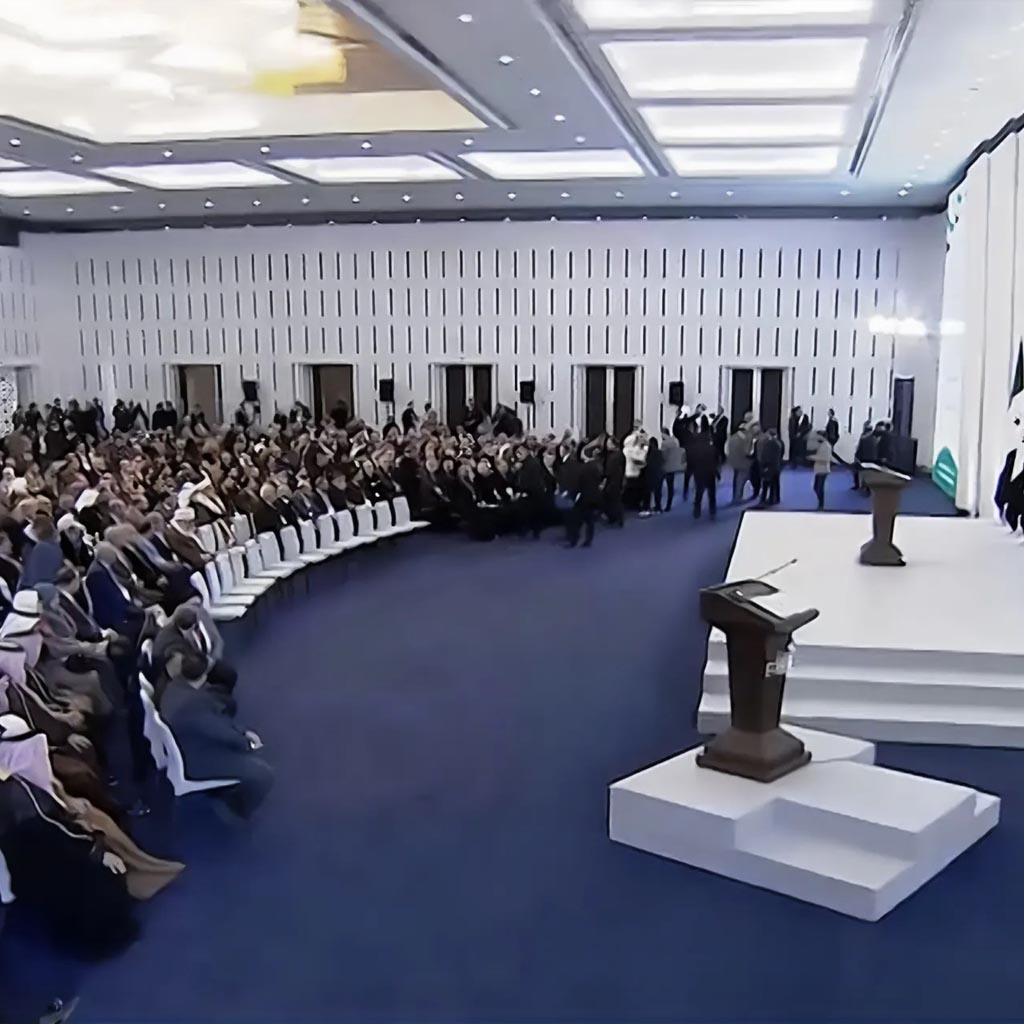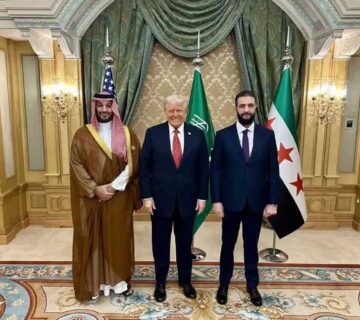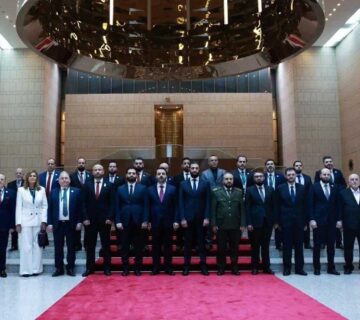The Syrian National Dialogue Conference, held in Damascus from February 24th to 25th, 2025, has concluded. The conference saw wide participation from national political forces, civil society representatives, economic and academic figures, as well as representatives of Syrians both inside and outside the country. This conference is considered a pivotal moment in establishing a new political system that reflects the aspirations of the Syrian people following the victory of the blessed Syrian revolution.
The conference opened with an address by President Ahmed al-Shar’a:
“In the name of God, the Most Gracious, the Most Merciful. Praise be to God, and prayers and peace be upon the Messenger of God, his family, his companions, and those who follow him.
And after… Syrian history has passed through a century of challenges and transformations, from the stage of colonialism to political disorientation, through unity, then the Ba’ath Party, to the rule of the two Assads. During this era, Syria endured various social, economic, political, psychological, and moral pains and woes. Hyenas gnawed at it and reveled in its blood. Then came the blessed Syrian revolution, followed by the clear victory and the great conquest that saved Syria from destruction. It was saved, but it is burdened with wounds. Today, it stands before you in intensive care, joyful yet wounded and suffering, calling for you to stand united and cooperative to heal its wounds.
Syria today has returned to its people after being stolen while its children were unaware. Preserve your trust, cherish it, and fulfill your duties, ladies and gentlemen. The greatest remedy for your country today is to feel its pain and suffering. May God protect you, O Sham! May God protect you, O Sham!
Dearly beloved, we are a nation created free. We learned courage, patience, generosity, and good morals in our religion, and we have employed them in every battle. We do not excel at weeping over ruins, nor do we excel at wailing and lamenting. We are a nation of work and diligence. If we say, we do; if we wish, we fulfill; if we promise, we deliver, God willing. We uproot thorns with our own hands. We face hardships, we brave storms, we confront, and we do not relent or surrender. We are the people of Sham, the people of this land and its essence.
Ladies and gentlemen, as we stand before this great responsibility, it is fitting for us today to consider the following:
- We are in the stage of rebuilding the state anew, with all the devastation and destruction it has suffered, and this stage has critical characteristics and features that differ from a state with a continuous system where individuals change but the system remains. Confining weapons and monopolizing them in the hands of the state is not a luxury, but a duty and an obligation.
- Syria does not accept division; it is an integrated whole, and its strength lies in its unity.
- Syria suffers from the systematic destruction of its economy and basic services, and the factors of its revival lie within it. It needs an emergency plan, then a medium-term one, then a strategic one. We must turn calamities into viable investment opportunities. We must build our state on law, and the law must be respected by its makers so that people respect it.
- We must be patient and not burden Syria with more than it can bear.
- Syria needs bold decisions that address its problems with real solutions, even if they are painful and shocking. Syria has fallen behind its regional and international surroundings, and it must hasten to catch up. Appropriate steps must be taken to achieve this.
- Peace is a duty upon all citizens of the nation, and the suspicious calls that invoke a state of emergency for certain sects and present themselves as the protecting savior are empty calls that do not deceive Syrian awareness.
- Syria is a school of coexistence from which the whole world learns, and the regime kept scaring people with annihilation until its lie was exposed within days.
- The victory achieved and the joy of the Syrians have displeased some people here and there, and they seek to undermine the achievements of the people. We must be cautious and confront with firmness, strength, and resolve anyone who wants to tamper with our security and unity.
- The system of government of any country is closely aligned with the historical stage preceding its establishment and the deep-rooted and authentic culture of the people of the country. We should not import systems that do not suit the country’s situation. We must avoid turning societies into testing grounds for implementing political dreams that are not suitable.
- During the past two months, we have worked to pursue the perpetrators of crimes against Syrians, and we will work to form a transitional justice body that will restore rights to the people, provide justice, God willing, and bring criminals to justice.
Ladies and gentlemen,
During the liberation battle and afterward, we sought to spare bloodshed and avoid the destruction of cities, and we used various methods for this, all so that Syrians could sit together and rebuild their country. Perhaps some have doubted some of these methods. Just as you accepted this victory from us, I kindly ask you to accept its methods from us.
Just as Syria liberated itself, it is fitting for it to rebuild itself. We are a dignified people who do not know the meaning of begging, humiliation, or disgrace. Living nations are those that possess a wealth of moral values. When they adhere to them, they succeed, and when they abandon them, they fail.
It is necessary to consider reforming what the fallen regime has destroyed in the moral structure and values of our society. What we are experiencing today is a rare, exceptional historical opportunity. We must seize every moment for the benefit of our people and nation, befitting the sacrifices of its children.
In conclusion, I can only express my sincere gratitude to the preparatory committee, the attendees, and everyone who contributed and participated, and to all the Syrian people and those who stood with them. May God help you, honor you, and write goodness on your hands. Peace be upon you, and God’s mercy and blessings.”
Following President al-Shar’a’s address, Foreign Minister Dr. Asaad al-Shaibani spoke:
“Mr. President, esteemed attendees, it is my honor to congratulate our people once again on the victory of the will of the Syrian people first and foremost. Our victory today, in this meeting, is that of free Syrians representing national interests and striving to achieve them in a generous and free country.
In recent years, Syria has faced exceptional circumstances that were not limited to a systematic war waged by a criminal regime but extended to attempts at political and economic isolation and targeting the social fabric of the Syrian people. However, despite the challenges and after the liberation of Syria, we did not succumb to these pressures. Instead, we worked according to a balanced foreign policy based on openness, dialogue, and effective diplomacy, relying on our firm principles of respecting national sovereignty, non-interference in the affairs of others, and cooperation based on mutual interests.
Our approach has been clear from the beginning: Syria is an integral part of its surroundings, and it believes that regional and international action is the way to face the challenges that threaten our countries and peoples. From this standpoint, the past period has witnessed Syria’s presence at important international conferences such as the Riyadh Conference, Davos, Paris, Munich, the World Government Summit in the UAE, and the AlUla Conference in Saudi Arabia. In the coming days, we will participate in the Arab ministerial summit, then the presidential summit, in addition to receiving and visiting all active countries in the region and the world. This represents an important step in restoring Syria’s active role at the regional and international levels.
Regarding economic sanctions, through effective diplomacy and continuous communication with friendly countries, we have succeeded in suspending some of them and mitigating their effects by strengthening economic cooperation with allied countries and searching for alternatives that contribute to achieving economic stability for the Syrian people. We have been clear in our positions that these sanctions are illegal and are not based on any legal or moral basis, but are used as a tool to pressure the will of the Syrian people. This has been realized by many countries that have begun to review their policies towards Syria.
We have pursued Syrian foreign policy through several stages:
First: Balance and openness, where we were keen to develop strong relations with countries that respected our sovereignty without closing the door to dialogue with any party wishing to rebuild its relations with us based on mutual respect.
Second: Adhering to national constants. We have not and will not accept any infringement on our sovereignty or the independence of our national decision, and we will continue to work according to a policy that preserves the interests of the Syrian people, away from any external pressures or dictates.
Third: Enhancing regional and international cooperation. Because we believe that security and stability in Syria reflect positively on the region and the world, we have continued our efforts to enhance cooperation with our partners in the region on security, political, and economic issues.
Fourth: Working on reconstruction and lifting sanctions. We have focused on building real partnerships with countries wishing to contribute to the reconstruction of Syria and opening new horizons for investment and cooperation in various fields.
In conclusion, Syria faces the most formidable challenges. Syria has faced the most formidable challenges and has persevered, and today it is capable of rebuilding its relations in a way that achieves the interests of its people and restores its leading role in the region.
From this platform, we reiterate our assertion that we are continuing our serious diplomatic work with all countries that believe in dialogue and cooperation for a more stable and just future for our people and the people of the region. Thank you.”
The preparatory committee, consisting of seven individuals, was then introduced:
- Head of the Preparatory Committee: Mr. Maher Aloush, a writer and researcher interested in intellectual and political issues, with numerous articles and research papers published online.
- Official Spokesperson of the Preparatory Committee: Mr. Hassan al-Dughaim.
- Secretary of the Preparatory Committee: Mr. Mohammed Mustat.
Committee Members:
- Dr. Mustafa al-Mousa
- Dr. Youssef al-Hijr
- Ms. Huda al-Atassi
- Dr. Hind Kabawat
Mr. Maher Aloush then addressed the conference:
“Peace be upon you, and God’s mercy and blessings. Mr. President, ladies and gentlemen,
We meet today at the National Dialogue Conference, and we feel the great responsibility placed upon us in shaping the future of our country, keeping in mind what achieves the interests of the Syrian people.
Esteemed attendees, the revolution is a stage based on confronting the stage of the tyrannical regime. Therefore, it was necessary to establish a new stage based on the values of freedom, justice, and dignity. The beginning was at the Victory Conference, which declared the victory of the great Syrian revolution over the tyrannical regime. There, the foundation stone for the transitional phase was laid, and Mr. President Ahmed al-Shar’a was chosen as President of the Republic.
Some urgent issues that could not be delayed were addressed, such as the dissolution of the parliament, authorizing the President to form a temporary legislative council, abolishing the constitution, suspending exceptional laws, dissolving the army and security institutions, and dissolving the Ba’ath Party.
As a continuation of the Victory Conference, the National Dialogue Conference, for which we are gathered today, comes to inform you of what we have reached. The dialogue process among Syrians began the moment Assad was overthrown, and all Syrian regions witnessed serious dialogues stemming from the keenness to:
- Build the new Syrian state. These dialogues culminated in the President of the Republic assigning the preparatory committee for the National Dialogue Conference the task of organizing these dialogues and transforming them into practical outputs that form a roadmap for the next stage.
- The preparatory committee immediately began holding its meetings, and after several deliberations, its internal regulations, which govern the committee’s work, were approved.
- Then we set work plans that focused on holding the National Dialogue Conference with the presence of highly qualified national figures, and they were on two tracks:
First: Drawing a map of listening to Syrians to identify the main ideas that will be discussed at the National Dialogue Conference.
Second: Setting the criteria upon which the colors of the Syrian spectrum will be represented at the National Dialogue Conference.
Then we began working by holding a large series of meetings and workshops, especially the central dialogue sessions in the Syrian governorates. We listened to nearly 4,000 Syrian men and women from various components and conducted numerous dialogues to listen to different opinions and ideas. We also listened to more than 2,000 interventions and received more than 700 written contributions. While the committee was holding its dialogue sessions in the governorates, the supporting teams were collecting data, ideas, and proposals presented in those meetings. Then work was done to extract the main themes around which most of the Syrians’ dialogues revolved, and it appeared to us that there are six themes whose importance has emerged in the Syrians’ dialogues. It can be said that there was near-unanimous agreement on their necessity and importance:
- The first theme: Transitional justice.
- The second theme: Constitutional building.
- The third theme: Institutional reform.
- The fourth theme: Public freedoms and political life.
- The fifth theme: General economic principles.
- The sixth theme: The role of civil society organizations in building and establishing the Syrian state.
Today, as we gather at the National Dialogue Conference, and you have taken it upon yourselves to serve the nation and look forward to its supreme interests, we welcome you most warmly, announcing the commencement of the National Dialogue Conference agenda. Shortly, we will embark together on specialized workshops according to your choices of the aforementioned themes, asking God Almighty to grant you success in reaching the desired outcomes.
I ask the Mr. President’s permission to begin the conference activities, and I kindly request the ladies and gentlemen to remain in their places until the Mr. President leaves the hall. May God bless you.”
With the attendance of over 600 figures from all Syrian governorates, and after holding six specialized workshops over two working days, the conference concluded by adopting the following outcomes:
- Preserving the unity and sovereignty of the Syrian Arab Republic over all its territories, and rejecting any form of fragmentation, division, or concession of any part of the national territory.
- Condemning the Israeli incursion into Syrian territories as a flagrant violation of Syrian sovereignty and demanding its immediate and unconditional withdrawal. Rejecting the provocative statements of the Israeli Prime Minister and calling on the international community and regional organizations to uphold their responsibilities towards the Syrian people and exert pressure to stop the aggression and violations.
- Confining arms to the state, building a professional national army, and considering any armed formations outside official institutions as outlaw groups.
- Expediting the announcement of a temporary constitution commensurate with the requirements of the transitional phase and ensuring the filling of the constitutional void to accelerate the work of Syrian state agencies.
- The need to expedite the formation of the temporary legislative council, which will assume the tasks of the legislative authority according to criteria of competence and fair representation.
- Forming a constitutional committee to draft a permanent constitution for the country that achieves a balance of powers, consolidates the values of justice, freedom, and equality, and establishes a state of law and institutions.
- Promoting freedom as a supreme value in society, considering it a precious gain for which the Syrian people paid with their blood, and guaranteeing freedom of opinion and expression.
- Respecting human rights, supporting the role of women in all fields, protecting children’s rights, caring for people with special needs, and activating the role of youth in the state and society.
- Establishing the principle of citizenship, rejecting all forms of discrimination based on race, religion, or sect, and achieving the principle of equal opportunities away from ethnic and religious quotas.
- Achieving transitional justice by holding accountable those responsible for crimes and violations, reforming the judicial system, enacting necessary legislation and appropriate mechanisms to ensure justice, and restoring rights.
- Establishing the principle of peaceful coexistence among all components of the Syrian people, rejecting all forms of violence, incitement, and revenge, in a way that enhances societal stability and civil peace.
- Achieving political development based on principles that guarantee the participation of all segments of society in political life, issuing appropriate laws for this, and emphasizing political isolation procedures based on fair principles and criteria.
- Launching the wheel of economic development and developing the agricultural and industrial sectors by adopting stimulating economic policies that enhance growth, encourage investment, protect investors, meet the needs of the people, and support the prosperity of the country.
- Calling for the lifting of international sanctions imposed on Syria, which, after the fall of the regime, have become a direct burden on the Syrian people, increasing their suffering and hindering the reconstruction process and the return of displaced persons and refugees.
- Reforming and restructuring public institutions, initiating the digital transformation process to enhance the efficiency and effectiveness of institutions, help combat corruption and administrative flabbiness, and considering employment criteria based on nationality, integrity, and competence.
- The necessity of civil society organizations’ participation in supporting society, activating the role of NGOs to support government efforts in reconstruction, and state support for civil society organizations to ensure their effective role in achieving development and stability.
- Developing the education system, reforming curricula, setting plans aimed at bridging educational gaps, ensuring quality education, focusing on vocational education to create new job opportunities, and linking education with technology to ensure a better future for coming generations.
- Promoting a culture of dialogue in Syrian society, continuing dialogues at various levels and scales, finding appropriate mechanisms for this, and in commitment to the principle of transparency, a detailed report will be issued by the preparatory committee presenting the contributions and opinions of the attendees at the National Dialogue Conference.



